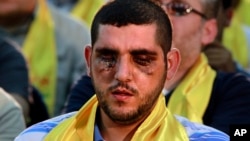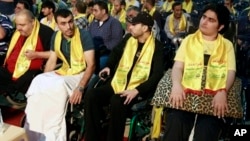BEIRUT —
The decision by Western and Arab Gulf nations to speed up weapons deliveries to Syria’s anti-government rebels is testimony to the battlefield effectiveness of Lebanon’s Hezbollah fighters, according to regional analysts and military experts.
Since the Hezbollah guerrillas appeared in force on the Syrian battlefields this spring alongside President Bashar al-Assad’s army regulars, they have put the brakes on a rebel offensive. Then they turned the momentum of battle around by seizing the strategic town of Qusair on the Syrian-Lebanese frontier, which had been in rebel hands since last year.
Tipping point or not, the capture of Qusair demonstrated the military edge Hezbollah has brought in with rigorously trained and disciplined fighters and an grasp of battlefield tactics honed from decades of conflict with Israel.
Hezbollah fighters spearheaded the retaking of Qusair. Initially Hezbollah reservists were deployed but then elite and special-forces units were send in to overcome stiffer than expected resistance from foreign jihadists on the rebel side, say Hezbollah and Syrian rebel commanders.
Qusair’s rebel defenders used a system of tunnels to move fighters around, a defensive tactic that had stymied Syrian army regulars. But Hezbollah was familiar with the tactic, which it had used in fights with Israeli forces, and knew how to counter it.
The decision to send more lethal weapons to the anti-government rebels came in a meeting this past weekend at Doha, Qatar, of the Friends of Syria, a group of 11 Western and Middle East countries.
Kerry: weapons supplies essential
U.S. Secretary of State John Kerry said weaponry was needed urgently, and “We have no choice . . . but to provide greater assistance.” In a joint declaration, the group’s foreign ministers said they hoped “to change the balance of power on the ground.”
The representatives at Doha also took the action in response to desperate appeals for help from General Salam Idriss, commander of the rebels’ Supreme Military Council.
The military stakes in the Syrian conflict have risen dramatically since President Barack Obama decided earlier in the month to send lethal aid to the rebels.
With Gulf countries reportedly ready to supply the rebels with anti-aircraft and anti-tank weapons, and Russia supplying Assad’s forces with a state-of-the-art air-defense system, the conflict is fast developing into a full-scale proxy war. On one side are Syria, Shiite Iran and Russia, while on the other are the Sunni Muslim governments of Saudi Arabia and the Gulf countries as well as the United States and its allies.
But regional experts say no one in the struggle has had a greater impact in recent weeks than Iranian-backed Hezbollah. The Lebanese group’s appearance in force on the battlefield has prompted a new direction in a war that had ebbed and flowed and until this spring appeared to be slipping away from the Syrian government.
Hezbollah’s fighters have been schooled from a young age to submit to strict military discipline and are nurtured in a culture of martyrdom, believing God sanctions their struggles. Because of this, Lebanese author and commentator Michael Young says, Hezbollah will do what it takes to achieve success.
“Hezbollah is willing to take heavy casualties in Syria, if this allows it to rescue the Assad regime,” Young said. That reflects the importance Syria holds for Hezbollah as a longtime patron of the Lebanese Shiite movement.
Hezbollah’s military know-how
But what the Lebanese movement has brought Assad is more than that: Hezbollah is exporting its military know-how and military strength to complement the military advice the Syrian army is receiving from Iranian and Russian advisers, say U.S. officials.
“You can see the improvement in military strategy,” says a U.S. special forces officer, who asked not to be named because he is not authorized to speak to the media. “Assad’s forces are more focused strategically. First, there’s the rolling back of rebel positions along the Lebanese-Syria border that is denying easy access for the rebels to Lebanon, cutting and disrupting supply lines.
“That is as yet incomplete,” the special forces officer said, “but I expect to see more action to interdict Syrian territory neighboring the Lebanese town of Arsal. Then there’s a focus on clearing up some Damascus suburbs and reaching out to towns to the east of the capital that dominate logistical routes radiating out into central Syria.”
The officer said he expects those objectives to be secured and consolidated before Assad orders his forces to take on a much bigger battle against the rebel-held half of Aleppo, Syria’s onetime commercial hub.
When the time comes, Hezbollah fighters say they will be ready to help out.
In an interview with the NOW Lebanon news website, a Hezbollah fighter said the group’s elite units are “using the training in street fighting they received in Iran, which was done in mock cities specifically built for this purpose.”
According to a recent study of Hezbollah by British journalist Nicholas Blanford, that elite training was done with Israel in mind. He concluded that Hezbollah’s tacticians had focused since 2006 on ways to go on the offensive against Israel by seizing and holding Israeli towns.
Since the Hezbollah guerrillas appeared in force on the Syrian battlefields this spring alongside President Bashar al-Assad’s army regulars, they have put the brakes on a rebel offensive. Then they turned the momentum of battle around by seizing the strategic town of Qusair on the Syrian-Lebanese frontier, which had been in rebel hands since last year.
Tipping point or not, the capture of Qusair demonstrated the military edge Hezbollah has brought in with rigorously trained and disciplined fighters and an grasp of battlefield tactics honed from decades of conflict with Israel.
Hezbollah fighters spearheaded the retaking of Qusair. Initially Hezbollah reservists were deployed but then elite and special-forces units were send in to overcome stiffer than expected resistance from foreign jihadists on the rebel side, say Hezbollah and Syrian rebel commanders.
Qusair’s rebel defenders used a system of tunnels to move fighters around, a defensive tactic that had stymied Syrian army regulars. But Hezbollah was familiar with the tactic, which it had used in fights with Israeli forces, and knew how to counter it.
The decision to send more lethal weapons to the anti-government rebels came in a meeting this past weekend at Doha, Qatar, of the Friends of Syria, a group of 11 Western and Middle East countries.
Kerry: weapons supplies essential
U.S. Secretary of State John Kerry said weaponry was needed urgently, and “We have no choice . . . but to provide greater assistance.” In a joint declaration, the group’s foreign ministers said they hoped “to change the balance of power on the ground.”
The representatives at Doha also took the action in response to desperate appeals for help from General Salam Idriss, commander of the rebels’ Supreme Military Council.
The military stakes in the Syrian conflict have risen dramatically since President Barack Obama decided earlier in the month to send lethal aid to the rebels.
With Gulf countries reportedly ready to supply the rebels with anti-aircraft and anti-tank weapons, and Russia supplying Assad’s forces with a state-of-the-art air-defense system, the conflict is fast developing into a full-scale proxy war. On one side are Syria, Shiite Iran and Russia, while on the other are the Sunni Muslim governments of Saudi Arabia and the Gulf countries as well as the United States and its allies.
But regional experts say no one in the struggle has had a greater impact in recent weeks than Iranian-backed Hezbollah. The Lebanese group’s appearance in force on the battlefield has prompted a new direction in a war that had ebbed and flowed and until this spring appeared to be slipping away from the Syrian government.
Hezbollah’s fighters have been schooled from a young age to submit to strict military discipline and are nurtured in a culture of martyrdom, believing God sanctions their struggles. Because of this, Lebanese author and commentator Michael Young says, Hezbollah will do what it takes to achieve success.
“Hezbollah is willing to take heavy casualties in Syria, if this allows it to rescue the Assad regime,” Young said. That reflects the importance Syria holds for Hezbollah as a longtime patron of the Lebanese Shiite movement.
Hezbollah’s military know-how
But what the Lebanese movement has brought Assad is more than that: Hezbollah is exporting its military know-how and military strength to complement the military advice the Syrian army is receiving from Iranian and Russian advisers, say U.S. officials.
“You can see the improvement in military strategy,” says a U.S. special forces officer, who asked not to be named because he is not authorized to speak to the media. “Assad’s forces are more focused strategically. First, there’s the rolling back of rebel positions along the Lebanese-Syria border that is denying easy access for the rebels to Lebanon, cutting and disrupting supply lines.
“That is as yet incomplete,” the special forces officer said, “but I expect to see more action to interdict Syrian territory neighboring the Lebanese town of Arsal. Then there’s a focus on clearing up some Damascus suburbs and reaching out to towns to the east of the capital that dominate logistical routes radiating out into central Syria.”
The officer said he expects those objectives to be secured and consolidated before Assad orders his forces to take on a much bigger battle against the rebel-held half of Aleppo, Syria’s onetime commercial hub.
When the time comes, Hezbollah fighters say they will be ready to help out.
In an interview with the NOW Lebanon news website, a Hezbollah fighter said the group’s elite units are “using the training in street fighting they received in Iran, which was done in mock cities specifically built for this purpose.”
According to a recent study of Hezbollah by British journalist Nicholas Blanford, that elite training was done with Israel in mind. He concluded that Hezbollah’s tacticians had focused since 2006 on ways to go on the offensive against Israel by seizing and holding Israeli towns.













